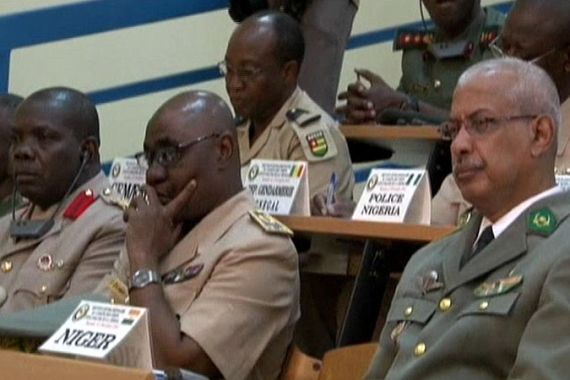West Africa bloc plans Mali intervention
ECOWAS leaders meet in Abuja to plan military strategy to recapture northern Mali from grip of Islamist fighters.

West African leaders have gathered for an emergency summit in the Nigerian capital to plot a military strategy seeking to wrest back control of northern Mali from Islamist groups.
The meeting in Abuja opened on Sunday and is attended by defence ministers from the West African bloc ECOWAS. It comes against a backdrop of growing fears over the risks the fighters – some of them with links to al-Qaeda – pose to the region and beyond.
Delegates from the 15-nation ECOWAS are expected to approve a military blueprint that will eventually be sent via the African Union to the UN Security Council for review.
Goodluck Jonathan, the Nigerian president, told the summit an intervention force was needed to flush out extremists to avoid “costly consequences” for Africa.
“Nigeria fully supports the recommendations of chiefs of defence staff for an intervention force to be deployed immediately to Mali to help restore order and stability there,” Jonathan said.
“This will be consistent with [a] UN resolution authorising the use of force to flush out the rebels and anarchists that have turned the northern part of that country into a lawless zone.
“This we must do to avert costly consequences, not only on Mali but on the entire sub-region and Africa in general.”
Non-ECOWAS members
Representatives from countries outside of ECOWAS also attended, including from Mauritania and Algeria, which neighbour Mali.
Al Jazeera’s Mohammed Adow, reporting from Abuja, said the summit would approve or reject the plan “and ask for more information to be included”.
“This is very crucial for the UN Security Council to accept and give a mandate to the planned intervention by ECOWAS and officials we have been speaking to say the plan includes a phased approach to the idea of planning to retake the north of Mali from the rebels,” he said.
Our correspondent said an “all-out war against some of the extreme elements of the rebels” was still on the cards.
But Algeria, though part of the summit, said an international military intervention into Mali may not help.
Kamal Rezzag Bara, terrorism and security advisor to Algeria’s President Abdelaziz Bouteflika, underlined the country’s deep-seated unease with international plans to invade northern Mali.
Bara said internationalising the crisis would only “aggravate the situation”.
He said Mali itself should be helped to come up with a roadmap and agreement involving all the actors to resolve the crisis.
“The question in Mali is an internal matter and there is no need to further internationalize it,” he said.
‘Maximum pressure’
Said Djinnit, the UN special representative for West Africa, said: “Maximum pressure must be maintained with a strengthened military intervention plan.”
“Everybody wants a military intervention that targets only the terrorists… Our preferred option remains dialogue,” DJinnit told the AFP news agency ahead of the summit’s opening.
Mali was plunged into a political crisis after a coup in Bamako in March allowed Tuareg desert nomads, who had relaunched a decades-old rebellion for independence, captured the main towns in the desert north with the help of Islamist fighters.
The secular separatists were quickly sidelined by the Islamists, who had little interest in their aspirations for an independent homeland. They have since set about implementing their version of strict sharia law, meting out punishments including stonings and destroying World Heritage shrines.
Discussions among west African states so far have involved the deployment of more than 3,000 troops from the region to Mali.
More contributions will be requested from other countries. An ECOWAS source has said military chiefs were requesting a total of 5,500 troops.